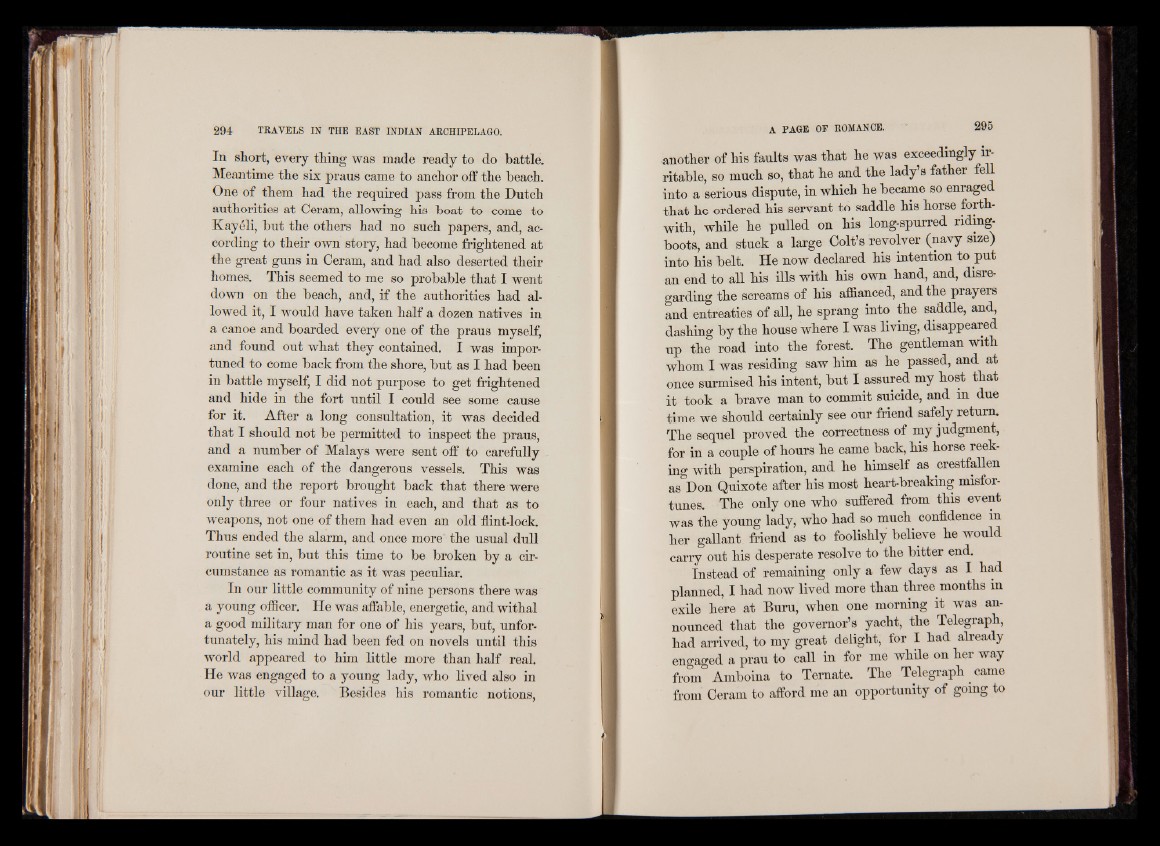
In short, every thing was made ready to do battle.
Meantime the six praus came to anchor off the beach.
One of them had the required pass from the Dutch
authorities at Ceram, allowing his boat to come to
Kayeli, but the others had no such papers, and, according
to their own story, had become frightened at
the great guns in Ceram, and had also deserted their
homes. This seemed to me so probable that I went
down on the beach, and, if the authorities had allowed
it, I would have taken half a dozen natives in
a canoe and boarded every one of the praus myself,
and found out what they contained. I was importuned
to come back from the shore, but as I had been
in battle myself, I did not purpose to get frightened
and hide in the fort until I could see some cause
for it. After a long consultation, it was decided
that I should not be permitted to inspect the praus,
and a number of Malays were sent off to carefully
examine each of the dangerous vessels. This was
done, and the report brought back that there were
only three or four natives in each, and that as to
weapons, not one of them had even an old flint-lock.
Thus ended the alarm, and once more the usual dull
routine set in, but this time to be broken by a circumstance
as romantic as it was peculiar.
In our little community of nine persons there was
a young officer. He was affable, energetic, and withal
a good military man for one of his years, but, unfortunately,
his mind had been fed on novels until this
world appeared to him little more than half real.
He was engaged to a young lady, who lived also in
our little village. Besides his romantic notions,
another of his faults was that he was exceedingly irritable,
so much so, that he and the lady’s father fell
into a serious dispute, in which he became so enraged
that he ordered his servant to saddle his horse forthwith,
while he pulled on his long-spurred riding-
boots, and stuck a large Colt’s revolver (navy size)
into his belt. He now declared his intention to put
an end to all his ills with his own hand, and, disregarding
the screams of his affianced, and the prayers
and entreaties of all, he sprang into the saddle, and,
ffaabiug by the house where I was living, disappeared
up the road into the forest. The gentleman with
whom I was residing saw him as he passed, and at
once surmised his intent, but I assured my host that
it took a brave man to commit suicide, and in due
time we should certainly see our friend safely return.
The sequel proved the correctness of my judgment,
for in a couple of hours he came back, his horse reeking
with perspiration, and he himself as crestfallen
as Don Quixote after his most heart-breaking misfortunes.
The only one who suffered from this event
was the young lady, who had so much confidence in
her gallant friend as to foolishly believe he would
carry out his desperate resolve to the bitter end.
Instead of remaining only a few days as I had
planned, I had now lived more than three months in
exile here at Buru, when one morning it was announced
that the governor’s yacht, the Telegraph,
had arrived, to my great delight, for I had already
engaged a prau to call in for me while on her way
from Amboina to Ternate. The Telegraph ^ came
from Ceram to afford me an opportunity of going to